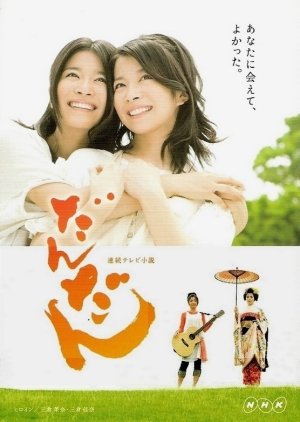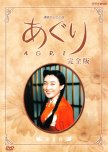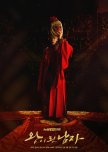The 79th NHK Asadora is Dandan, a story about twin girls Megumi and Nozomi who had been separated at birth by their parent's divorce, but meet unexpectedly and discover their tight bonding. Together they decide to seek their career in singing. Tajima Megumi is an active high school girl in Shimane prefecture who loves to sing in a band on the streets. Ichijo Nozomi is a maiko - an apprentice geisha raised strictly by her geisha mother in Kyoto. The two girls meet by coincidence one day, and realize they had been brought to each other by a powerful fate because of their striking resemblance. Locations include Shimane and Kyoto. Dandan means "thank you" in the Izumo dialect. Edit Translation
- English
- magyar / magyar nyelv
- dansk
- Norsk
- Native Title: だんだん
- Also Known As: Thank You ,
- Director: Ohara Taku
- Screenwriter: Moriwaki Kyoko
- Genres: Music, Life, Youth, Drama
Cast & Credits
- Mikura Mana Main Role
- Mikura KanaIchijo NozomiMain Role
- Yoshida Eisaku Support Role
- Suzuki SawaTajima YoshikoSupport Role
- Mitsubayashi KyokoTajima HatsueSupport Role
- Kishibe IttokuTajima SosukeSupport Role
Reviews

This review may contain spoilers
One quote to sum up Dandan: "Whatever happens, stay in touch and help each other out" - said the guy, actually the twins' father, who didn't want them to ever meet and didn't want them to ever meet again after they found out about each other.Story: The biggest problem of the series, in my opinion, is probably that you wouldn't know they're twins if they weren't looking exactly alike. They don't know of their existence until their 18th birthday, so everyone would probably expect them to be really close after they decide to acknowledge each other, but it's more like they're distant cousins rather than sisters, let alone identical twins. The amount of scenes they are in together is probably less than the number of episodes the show has and I couldn't really see much chemistry between them if they were together. Both of them solved their respective problems/hardships without the other and the few episodes they really relied on each other were marginal problems without impact on the story. The synopsis is also a bit misleading. The whole singing career part probably takes up 4 or 5 weeks. Most of the first half of the series, after they decided to stay in touch, is them agonizing over or denying that they want to pursue a music career. There are whole weeks when nothing at all happens and then there are weeks when everything happens all at once, without leadup or explanation. Just to give an example, in one of the last weeks of the series Megumi and the "male lead" act like they barely know each other and the next week they are suddenly married (not getting married, they already are out of the blue), without proposal or leadup at all. Sure, there was some romantic tension between them, but that was in the first half of the series, before they were even in the music business (which happens pretty much in the middle of the story).
In my opinion, most of what happens in Matsue is rather boring and the most enjoyable and interesting parts of the story all take place in Gion, even if I'm not a fan/not interested in Geiko culture and their traditions.
Acting: I can't say that I was impressed with anyone's acting. The twins, while overall pretty likeable, often looked like they saw a flying pig everytime something happened, even if it wasn't surprising at all. The accents often sounded pretty forced from almost every actor/actress and most of the characters, mainly from Matsue, were either forgettable, annoying or seemed a bit "uneducated". The best job did probably the Okami, Fujimura Shiho and the Geikos, especially Kyono Kotomi and Kimura Fumino, even if their roles were very small. The worst performance was definitely by Yamaguchi Shoko, who plays the "male lead", the music producer Ishibashi. It was like everytime someone needed to push an on button if his part came up. Very robotic throughout the series and he always sounded like he was reading all his lines rather than just saying them. He was also giving me the impression that he's always one step away from luring them into the porn industry. His character seemed like one of those super shady scouts on the streets of Harajuku who are trying to trick girls into debt which they then need to pay back by selling their bodies.
Music: They were or at least wanted to be singers, but it's only 2 or 3 songs they always sing/play. It gets pretty repetitive. Not that they aren't good singers or the songs are bad, but they could've explored the music part a bit more.
I liked some of the side stories and the character development of the twins, but that's probably the only reason why I actually finished the series. I'd only recommend it to people who are really into the Geiko and Gion culture and traditions because that was the best fleshed out part of the story.
Was this review helpful to you?

This review may contain spoilers
"Song of Life"
"Dandan" is my eighth asadora thus far. I chose it because of the twin angle as well as Mikura Mana appearing in "Natsuzora," which I'm planning to watch soon. "Dandan" has a harsh score of 6.7 on MDL. To be fair, it's only been rated by eleven people but it doesn't feel very balanced. "Dandan" isn't bad; it's just not the best asadora anyone has every seen.The premise for this asadora is basically "The Parent Trap" so it's a bit derivative. However, I enjoyed this sort of "reimagining" of the premise and it was initially what hooked me into watching it. Two girls, Megumi (Mikura Mana) and Nozomi (Mikura Kana), meet by chance as if fate is pulling them towards one another. Megumi is an ordinary high school student living in Matsue, while Nozomi is a maiko (apprentice geisha) living in Kyoto. I think both girls have interesting, realistic reactions to finding out that their twins. Some of their family members reactions may seem harsh, but I also think it's realistic from the point-of-view of Japanese culture.
Megumi initially wants to become a professional singer, but then lands on deciding to be a caretaker [i.e. looking after the elderly at retirement homes]. She moves to Kyoto to go to college and starts living with Nozomi and their mother (Ishida Hikari). Ironically, this not only knocks Nozomi off her life's course, but also the story. After a lot of badgering from Ishibashi (Yamaguchi Shogo), the girls become twin singers in the same vein as The Peanuts (if you've seen Mothra, you know them). Strangely, their time as actual singers is very short compared to the build-up. Megumi almost immediately disbands the duo as soon as it grows in the wrong direction. Nozomi tries for a while on her own, but eventually goes back to being a maiko. As such, this whole middle section of the drama ends up feeling pointless.
The last section of the drama was what they should've been doing with the whole dram in my opinion. Megumi decides to become a nurse on top of a caregiver. Her love interest, Ishibashi, also leaves music and decides to become a doctor. Nozomi goes from being a maiko to a geisha. Her love interest is her former bandmate and manager, Kota (Kuboyama Tomohiro). His earnest admiration of her and willingness to watch to support her from afar is just sweet. I would've rather watch more of this even if it had the twins being in separate cities for most of the time.
Honestly, even the singing career path had its potential. What I'm frustrated with is the noncommitment to either storyline. "Hanbun, Aoi" comes to mind since it had a similar problem, but it was able to stick the landing better in my opinion thanks to the supporting cast. "Dandan" has some lovely side characters, but two of the male characters are particularly frustrating. Additionally, while I did cry, it wasn't able to hit all of those emotional notes I love so much in the last week.
Now that I'm done complaining. I will talk about its good points. Mana and Kana are wonderful as the heroines, though I preferred Kana's Nozomi to Mana's Megumi. Both heroines are played beautifully nuanced and I loved how their facial expressions perfectly encompassed their characters feelings at any given time. The female side characters were almost all amazing. I loved them all. I particularly found the girls' grandmother (Mitsubayashi Kyoko) to be poignant at this time for me. The girls' mother (Ishida Hikari) and Megumi's mother (Suzuki Sawa) were also stand-outs. And finally, the best point of the asadora is the music. It was all so good from the theme song to all of the songs that the girls sing throughout. "Ue o Muite Aruko," "Akai Sweet Pea," "M," etc.
So, in conclusion, I would argue that "Dandan" is worth watching, especially if you're an asadora enthusiast. I probably wouldn't recommend it to a beginner because it won't hook them in immediately. I enjoyed my time with this asadora and I will be singing the music it introduced me to for a long time.
Was this review helpful to you?
Recommendations
There have been no recommendations submitted. Be the first and add one.




































